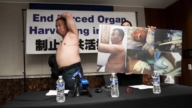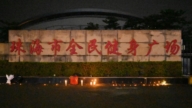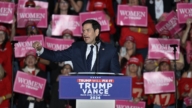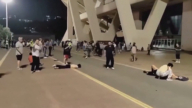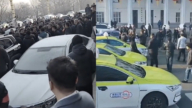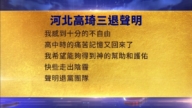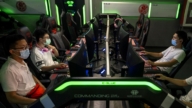【新唐人2014年02月10日訊】近年來,鋼貿商跑路、自殺等惡性事件頻頻出現。日前,國內媒體發佈消息,上海「鋼貿大王」肖家守4億6000多萬資產被查封。專家估計,全中國20萬家鋼貿商中,因資金鏈斷裂等連鎖危機,至少有三分之一將出局。
日前,大陸上市公司「新日恆力」發佈公告,因金融借款被起訴,公司實際控制人、上海「松江鋼材城」董事長——肖家守,4億6000多萬元的資產被查封。
據了解,有多家銀行起訴肖家守,其中主要為平安銀行、民生銀行及工商銀行。
而這次銀行申請執行查封肖家守資產,據報導,只是肖家守借貸糾紛大規模爆發的開端。起訴肖家守的金融借款糾紛案,已經多達11筆。
肖家守,現任上海松江鋼材市場、和蘇州長三角鋼材市場經營管理公司董事長,也是寧夏「新日恆力」、和上海「新日股權投資」等公司董事長。其中,上海松江鋼材市場是全國最大的鋼材市場之一,肖家守所代表的「鋼貿福建幫」,掌控了華東鋼材流通市場的半壁江山。
上世紀90年代中期,肖家守已進入鋼貿行業,除了在長三角地區擁有兩個鋼材交易市場外,他的資產還涉足金融、和地產開發。
有些鋼貿商透露,長三角地區,很多中小鋼貿商三五結群,通過交換鋼材貨存,向銀行連環擔保貸款,再把貸來的資金投到地產和股市裡套利,借款黑洞在鋼貿圈越滾越大。
2010年後,中共出臺地產調控政策,鋼價在2011年迎來暴跌,大部分鋼貿企業陷入巨大虧損和資金鏈斷裂的境地。2012年起,很多企業被銀行連帶追訴。進入2013年,鋼鐵等行業產能嚴重過剩,鋼材賣出「白菜價」,鋼貿商老闆破產、跑路、自殺的比比皆是。
據《上海證券報》報導,2011年至2013年,銀行對鋼貿商形成的不良貸款,陸續進入壞賬核銷階段。但銀行核銷不良貸款之後,可能在追債上不像以前逼得那麼緊。
《央視》財經評論員牛刀:「往哪兒核銷呢,沒人負責啊,荒唐的事嘛,它現在很多事情都摀住在那裏,最後出事要出大事,東城那個事情也是摀在那裏,最後由銀行來兜底,不是要命的事啊﹗壞賬核銷它怎麼銷啊﹖它這不是個小數字,它是個大數字,它無法銷。」
《新華社》報導,估計全國20萬家鋼貿商中,至少有三分之一將在危機中出局。
大陸企業觀察員何軍樵:「肖家守的企業的破產倒閉,實際上也是中國經濟面臨很大的危機的反映,還會有一批由於資金鏈的斷裂,投資回收收不回的情況下會倒閉。第二點,像肖家守這樣的商人,藉著改革開放這樣一個背景,他們都談不上成熟的企業家,一貫吃慣了政策飯,所以本身也不少不乾淨的行為。」
《新華社》分析說,鋼貿商如今的慘淡局面,根源於金融危機後的信貸大躍進。2008年後,隨著4萬億投資盛宴的開啟,鋼貿商開始大肆炒作鋼材。
牛刀:「本來它是沒有錢的,按道理,它要刺激經濟的話,它可以通過發債的手段,它沒有通過發債的手段,而是通過印鈔手段,手段本身是錯的,然後各級政府部門在銀行拿錢,甚麼抵押品都不要,當時。就是憑著條子,發改委的條子,就在銀行貸款,現在無法收拾了,影響了所有的工業。」
肖家守旗下的投資公司——上海「新日」,所持有的「新日恆力」8000萬股已被凍結。受此影響,「新日恆力」股價開盤日大跌8.13%。
何軍樵:「改革開放三十多年到現在,太子黨的企業,很少有遭到如此悲慘的局面,遭到如此悲慘的幾乎都是民營企業家,這也是值得深思的,恐怕也有政府背後的深刻的一個意義。」
大陸企業觀察人士何軍樵表示,所謂的「鋼鐵大王」,在中共眼裡不算甚麼,因為中國的經濟命脈不在他們手上,是在中共政權或太子黨的手裡。因此,民營企業的死活,對於當局來說,也就無關痛癢了。
採訪編輯/劉惠 後製/李智遠
Chinese Private Sectors Are at Stake
In recent years incidents of suicide amongst steel trading
businessmen have become frequent.
Xiao Jiashou, China’s steel-trading king, was reported to have
his core assets frozen.
Analysts estimate at least a third of the 200,000 steel trading
businesses in China will be gone because of credit stress.
The Chinese listed company Ningxia Xinri Hengli Steel Co.
was recently prosecuted for bad debts.
The court froze Xiao Jiashou’s stake worth about 460 million
yuan ($75.8 million) at the company.
The freezing is due to a loan dispute with Ping An Bank,
Minsheng Bank, and Industrial and Commercial Bank of China.
Xiao Jiashou’s asset freeze was believed to be just the
beginning of his massive credit loan disputes.
Banks have brought as many as 11 cases against Xiao.
Xiao Jiashou is Chairman of Shanghai Songjiang Steel Market,
Suzhou Yangtze Steel Market, Ningxia Xinri Hengli Steel Co.
and Shanghai Xinri Equity Investment Co.
Among them, Shanghai Songjiang Steel Market is one of the
largest steel markets in China.
The Steel Trade Fujian Gang represented by Xiao Jiashou
controls half of the Eastern China steel market.
Xiao Jiashou entered the steel trade industry in the mid 1990s.
His assets include the two steel markets in the Yangtze River
Delta region, as well as in finance and real estate.
Sources in steel trade revealed that many small and medium
steel traders work in a chain to secure loans from the banks
through the exchange of steel stock.
The loans were then invested in properties and stocks.
The problems of excessive loans to steel makers and traders
have been brewing.
The Chinese Communist Party real estate control policies in
2010 have ushered in the fall of steel prices during 2011.
The steel industry in China has become stranded
in financial crisis.
Since 2012, many lawsuits have been brought against the steel
industry by banks.
Seriously excessive steel has pushed the steel to be sold at the
price of “cabbage” and forced many owners in bankruptcy,
on the run, or suicide in 2013.
According to Shanghai Securities News report, since 2011
the banks have started to write off these account as
uncollectible for the bad loans to steel industry.
Consequently, the banks will not collect credit as harshly
as they used to.
Chopper, CCTV financial commentator: “How to get the
balance? No one will be responsible. This is ridiculous.
Everything is covered until the banks reveal the details.
People will die. How can bad loans be written off?
It is not a small figure. It is huge.
They cannot be written off."
Xinhua News Agency estimated at least one-third of the
200,000 steel trading businesses in China is at stake.
He Junqiao, Chinese enterprises observer: “Xiao Jiashou’s
bankruptcy reflects the financial crisis in China.
The breakage of the loan chains will lead to the failure to
recover the investments for many businessmen.
People like Xiao Jiashou, are not the real entrepreneurs.
They took advantage of the policies in reform and opening,
and have certainly had much misconduct in the process."
Xinhua News Agency analyzed the bleak situation of the
Chinese steel trading business is rooted in massive credit loans
after the financial crisis.
In 2008, the steel trade began to hype the industry with the
CCP’s 4 trillion (US$ 586 billion) stimulus package.
Chopper: “There was no money at the beginning. Ideally,
bonds should be the way to stimulate the economy.
But, instead of issuing bonds, they printed cash, which
was a mistake.
The governments and units took money from the bank.
There was no mortgage, but a note from the National
Development and Reform Commission.
With the note, they got the money from the bank.
That was it and it affected all industries."
Xiao Jiashou’s 80 million stake in Shanghai Xinri freeze has
led to 8.13% stock price fall of Xinri Hengli.
Shanghai Xinri is the largest shareholder of Xinri Hengli.
He Junqiao: “Since the reform and opening, it has always been
the private entrepreneurs being attacked and left with miseries,
rarely the princelings’ businesses.
It is also worth pondering, about the profound influences of
government."
Chinese enterprises observer He Junqiao does not believe the
meaning of so-called “Steel King” to the CCP.
China’s economic lifeline does not lay in their hands
but with the CCP or the princelings.
Therefore, the authorities couldn’t care less about the
life and death of private enterprises.
Interview & Edit/Liuhui Post-Production/Li Zhiyuan


